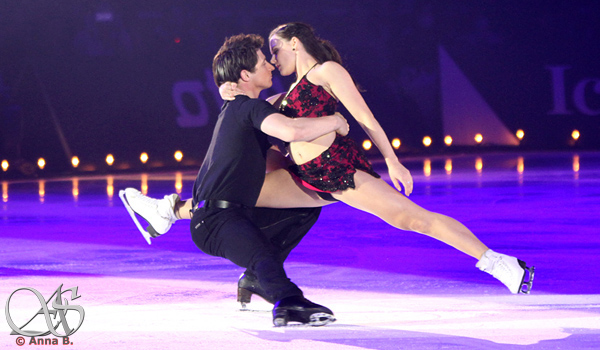Tessa Virtue and Scott Moir: excited, nervous, passionate
June 21, 2016
By Reut Golinsky
Photo © Anna Bertoloni
Special thanks to Tessa and Scott's fans who submitted part of the questions for this talk.
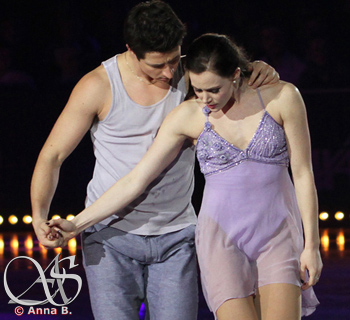 During the rehearsals of the "Ice Legends" I had an opportunity to catch up with the Olympic and two time World champions Tessa Virtue and Scott Moir. And with the exciting news about their return to competitions coming just before that we talked a lot about their new coaching team, motivation, thoughts and hopes.
During the rehearsals of the "Ice Legends" I had an opportunity to catch up with the Olympic and two time World champions Tessa Virtue and Scott Moir. And with the exciting news about their return to competitions coming just before that we talked a lot about their new coaching team, motivation, thoughts and hopes.
Their enthusiasm and impatience to meet this challenge were so contagious that now I can't wait for the next season to start.
You came to Geneva straight from "Stars on Ice" tour in Japan, how did it go?
Tessa: It was a great tour; we always love performing in Japan. We had nine shows in three cities, a bit of a quick tour but wonderful audiences. And it's always a thrill for us to skate there.
Which programs did you skate?
Scott: These are programs we've prepared for the "Stars on Ice". One of them was brand new, a show program to Justin Bieber's "Sorry". And the other one we've only performed once before, it's to a cover of "What's love got to do with it" performed by two friends of ours, Miku Graham and Michael Shand. They are really fun programs, a little bit different. As you know we're coming back, so we're trying to get in shape and I think these programs challenge us in unique ways.
Tessa: Yeah, particularly "What's love". We choreographed that with Marie-France Dubreuil and David Wilson. I think the challenge for us on tour is to maintain 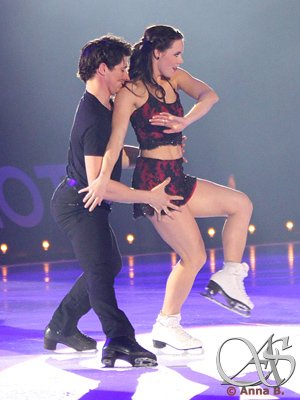 the integrity of the intention of the choreography and not to fall into our "default" mode of performing. I think the style of movement in working with David is quite different, just the weight transfers and how he holds his body on a circle of an edge is quite different for us. So little things like that, the nuances of the program, it took us a long time to prepare that one.
the integrity of the intention of the choreography and not to fall into our "default" mode of performing. I think the style of movement in working with David is quite different, just the weight transfers and how he holds his body on a circle of an edge is quite different for us. So little things like that, the nuances of the program, it took us a long time to prepare that one.
Do you plan to work with David on competitive programs too?
Scott: We're hoping so. And that's why we really wanted to do a show program with him as well. We had worked with him before on a little number, but when you're a competitive skater it's really tough to make show programs. We gave him an afternoon and he made us a great number, but we wanted to give him a project that he really can sink his teeth into, both him and Marie-France. We're lucky enough to be able to work with them as a team, what they bring together is so fantastic.
Tessa: They really bring out the best in one another. And what's neat with David is that he doesn't exactly know what is not possible in dance, so he can come with the fresh perspective. We can make it work with Marie-France, but I think that this limitless approach to creating something is really cool.
Scott: And it's really great to challenge us. We've been skating for so long, dancing for so long, so to have a choreographer who has not necessarily always done that really pushed us. As Tessa said we have a "default setting" that we always go back to, so David is really bringing us out of that and pushing us to our boundaries.
If we're talking about your team and plans for the season, do you know already how you will train? For example, will you share the ice with the French couple or 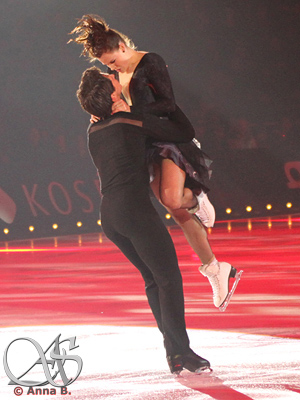 will you have separate training sessions?
will you have separate training sessions?
Tessa: Oh, no, the set up in Montreal is very much a team approach to training as far as we can tell. It's a really positive, supporting environment. Our hope is to share the ice with all of the teams there, I think it's beneficial to everyone, we can push each other and work hard, encourage one another. We're really looking forward to training with the French team, we've admired them and we've loved what they've done over the last couple of years, it's so impressive. They are really in a league of their own. So it will be really a joy to share the ice with them.
I'm asking because my impression was that your experience during your last Olympic season, when you continued training with your direct rivals, was less positive. And here, one would think, you could dictate your own rules and change that.
Tessa: But I'm not sure that there is a school out there that doesn't have a strong competitor. So there really isn't a place for us that we wouldn't run into the same problem. That's what we've known our entire career, that's what worked for us often. It's a bit of a unique atmosphere but at the same time for skating it's not uncommon. When you surround yourself with the best, it really works.
Scott: Yeah, for sure. Training with Gabi and Guillaume and all the other amazing couples there is really going to push us to be our best, and that's the main goal. We're not looking to go back and do something that we've done, we want to push ourselves. We really needed an atmosphere like that; we hope to use it to our advantage.
For us it's up to the integrity of the coach to maintain the fact that we both get our time. And we have full trust in Patrice, Marie-France, and Romain.
So Romain Haguenauer will work with you too? I wondered if there will be a certain "separation" there, because he brought the French team with him to Canada and I thought they were more of "his" team.
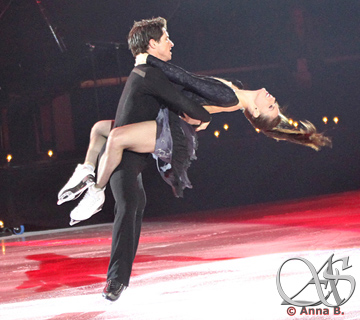 Tessa: The coaching staff at Montreal is very much a team and they work together so well. And they all have something different to bring to the table.
Tessa: The coaching staff at Montreal is very much a team and they work together so well. And they all have something different to bring to the table.
That sounds great.
Tessa: Yes! We're so excited. It makes sense for us to have a bit of a fresh energy right now and it just feels right being there.
Scott: And we've been super impressed with Gabi and Guillaume, on the ice especially. They step up and perform under difficult situations; this year was not easy for them, lots of injuries and some battles. And they really stepped up and skated fantastic and got their second World title. But off the ice as well, we've been so impressed. We went there before Worlds, just to do some show programs and get organized, and they were so nice to us, they are just first class people. We're excited to share the ice with them every day.
You've been friends with Patrice and Marie-France for a long time. Will your relationship change now, will you need to create a certain student-teacher distance maybe?
Tessa: It is something that we talked to them about. We have been friends for such a long time, but they've also played a mentor role for us over the years, so that doesn't feel foreign. But, of course, our relationship will change I think. And we're also adults, we take ownership of our own training, we're responsible and accountable for what we're doing on the ice. Every day we have this internal drive to push ourselves, so I think our history with Marie-France and Patrice can only add value to the dynamic of the team. We have such respect for them as coaches and we look to them for guidance and their expertise so we have no doubt that we'll be able to create a perfect balance.
Scott: This is interesting. The more we work with them, the more respect we gain and the fonder of them we are. I didn't expect that so much.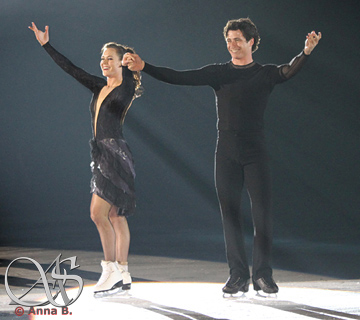
I think this is what happens in any great relationship between people, with partners, friends, mentors...
Tessa: Yes, absolutely. And they have a really great approach to the sport, perspective, we have so much to learn, which is nice, to be students again.
What do the lifts mean for you? Are they just a challenging element to perform? Or part of the whole choreographic concept? Do you create your lifts first and then build choreography around them?
Tessa: For sure it depends on a theme and on a concept of the story. We try to approach every element the same way and to see that it does contribute to the story. We want to tell the story from beginning to end, and we'd like everything to be seamless in transitions. The thrill, the interesting part is in creating lifts that are level four and are difficult and that also stay in a character.
In one of your recent interviews when you were asked about your favourite free program you named rather old ones - "Valse Triste", "Umbrellas of Cherbourg". Is there any reason for that? You had so many amazing programs after that. Do those programs cause nostalgic feelings? Or your more recent seasons were too tense to enjoy?
Tessa: I don't know, it's always been this way that things that are more recent I'm still so critical of. So I appreciate the things that we've done a decade ago and think: "Oh, we were better then!"  Things that we did more recently, even our Olympic programs, while we love them it's still a little too fresh. And we are perfectionists; we look back and think there was so much we could've done better. That's also a part of the motivation we're coming back, because we do feel there is so much room for improvement.
Things that we did more recently, even our Olympic programs, while we love them it's still a little too fresh. And we are perfectionists; we look back and think there was so much we could've done better. That's also a part of the motivation we're coming back, because we do feel there is so much room for improvement.
Scott: And there is also a little bit of a magic in your first Worlds, your first senior event, first time medalling at Worlds... So I think those programs are also tied to that. I mean "Valse Triste" was the very first season that we were senior at Worlds, we skated amazingly and it goes along with all those great memories. So I think it has something to do with that as well.
How do you feel about the next season? And I will make it harder for you: describe it in three words.
Tessa: Hm... How do we feel? I think we're so excited. We're so looking forward to the challenge of competing again and preparing new programs. The whole process is really appealing to us at the moment. The structure, the regiment, the training schedule, getting settled in Montreal, and just being athletes again, we're captivated by that notion right now.
Scott: Yes, "excited" is the big one. That was the first one that came into my head. "Nervous" I think is another one. I feel there is so much work to do, two years off is a long time and the reason why we decided to come back is because we knew there will be big challenges, but we don't know what those are going to be yet, so that makes you a little be nervous and anxious.
(to Tessa) What's your third word going to be? Mine is "passion", "passionate". It's a reason why we're coming back, we feel like we can grow our skating in different ways and try to develop a new style than what people were used to see in, I guess, our "former" era of skating.
Tessa: Hopefully. We will try.
